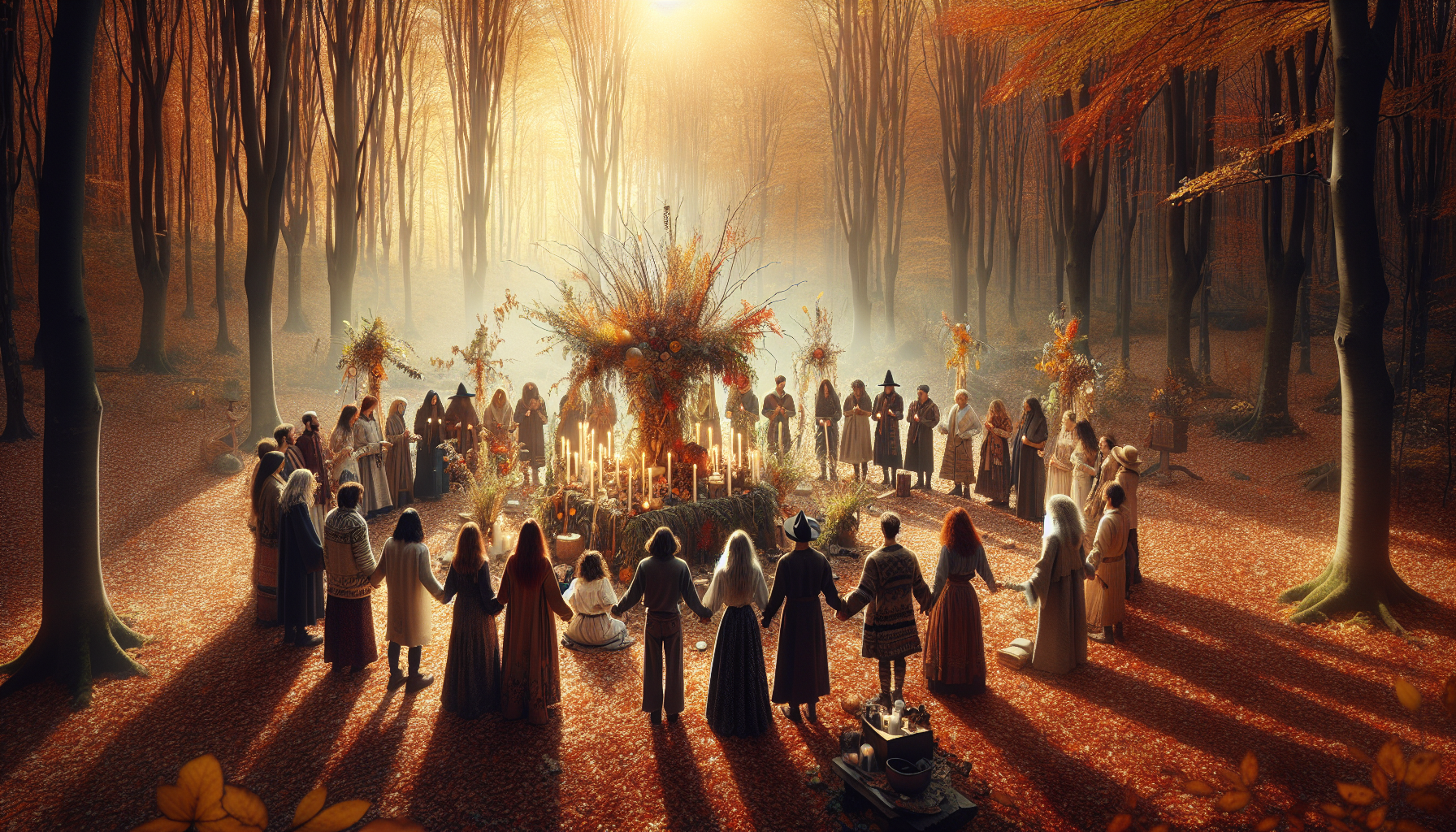In the heart of ancient Greece, where myths intertwined with the very fabric of everyday life, the world was alive with mysteries and magic. Among the myriad wonders of this enchanting era stood the sacred groves, lush sanctuaries where nature and divinity met in a harmonious embrace. It was here, beneath the whispering leaves and towering trunks of ancient trees, that the Greeks sought answers to life’s most profound questions. These majestic trees, revered as living oracles, held the secrets of the universe, their rustling leaves believed to be the voice of the gods themselves. 🌳✨
Our journey begins in these verdant temples, where the ancients listened with rapt attention to the enigmatic language of the trees. In a world without the distractions of modern technology, the Greeks had cultivated a profound connection with nature. They recognized the wisdom embedded in every rustle of the leaves and every creak of the branches, seeing the trees not just as part of the natural landscape but as intermediaries between the mortal and the divine. This sacred relationship formed the backbone of their spiritual practices, influencing everything from personal decision-making to state affairs.
Throughout this exploration, we will delve deep into the historical and cultural significance of trees as oracles in ancient Greece. We will unravel how the ancients interpreted the signs and symbols conveyed by these natural giants, transforming their cryptic messages into guidance for individuals and communities alike. As we navigate through the intricate tapestry of mythology, folklore, and historical accounts, you will discover how this arboreal wisdom was woven into the very soul of Greek society.
Moreover, we will examine the specific types of trees that were held in the highest regard, such as the revered oak of Dodona, whose whispers were thought to convey the will of Zeus himself. The olive tree, sacred to Athena, and the laurel, favored by Apollo, also played pivotal roles in this mystical tradition. By understanding the unique attributes and mythological associations of these trees, we gain insight into why they were chosen as conduits for divine guidance.
Finally, our exploration will reveal the enduring legacy of these practices and their relevance in today’s world. In an age where we often feel disconnected from nature, the ancient Greek tradition of seeking wisdom from the trees offers a timeless reminder of the profound connection between humanity and the natural world. By embracing this ancient knowledge, we can unlock new ways of seeing and understanding our place in the universe, guided by the same wisdom that once shaped the destinies of civilizations long past.
As we embark on this enlightening journey through time and myth, prepare to see the world through the eyes of the ancients, where every tree holds a story, every breeze carries a message, and the wisdom of the ages awaits those who listen closely. Let us open our hearts and minds to the divine guidance that flows through the branches of these mystical oracles, inviting their timeless wisdom to illuminate our path forward. 🌿
The Enchantment of Trees in Ancient Greek Culture
In the heart of Ancient Greece, a civilization renowned for its rich mythology and profound philosophical inquiries, trees were revered as sacred entities, potent with divine wisdom and mystical powers. The Greeks, with their deep connection to nature, saw trees not just as mere flora, but as living oracles, guardians of the earthly and spiritual realms. This intricate relationship between humans and trees in Ancient Greece unfolded a fascinating narrative where trees served as conduits for divine guidance, providing insights into the mysteries of life and the universe.
From the olive groves of Athens to the oak forests of Dodona, trees held a central place in Greek spiritual and cultural life. They were seen as bridges between the terrestrial and celestial, their roots delving deep into the earth and branches reaching for the heavens. The Greeks believed that by communing with these natural giants, they could tap into a higher consciousness, accessing the wisdom of the gods. This belief was not just metaphorical but was ingrained in their religious practices and daily lives. Temples and sacred groves dedicated to various deities often featured prominent trees, around which rituals and ceremonies were performed.
In this context, trees served as oracles, communicating messages from the divine realm to the mortal world. The most famous of these arboreal oracles was the Oracle of Dodona, dedicated to Zeus, where the rustling leaves of the sacred oak were interpreted by priests and priestesses. This ancient practice highlights the Greeks’ profound respect for nature and their belief in its intrinsic ability to guide and inform human affairs. By listening to the subtle whispers of the trees, they sought answers to existential questions, guidance in political matters, and foresight into the future.
The Role of Trees in Greek Mythology and Religion
Greek mythology is replete with stories that illustrate the significance of trees in the spiritual and everyday life of the Greeks. Trees were often personified as dryads or nymphs, entities that protected the forests and nature. These mythological beings were believed to inhabit the trees and were considered intermediaries between the gods and humans. The respect and reverence for trees were so profound that cutting down a sacred tree without permission was deemed sacrilegious and could incur the wrath of the gods.
One of the most significant trees in Greek mythology is the olive tree. According to legend, the olive tree was a gift from Athena to the city of Athens. It symbolized peace, prosperity, and wisdom, and its fruit became a staple in the Greek diet and economy. The sacredness of the olive tree was such that it became a central symbol in the Panathenaic Games, a religious festival held in honor of Athena. This deep-rooted symbolism underscores the cultural and spiritual importance of trees in Greek society.
Furthermore, the yew tree, known for its longevity and evergreen nature, symbolized immortality and the eternal cycle of life and death. It was often associated with Hecate, the goddess of magic and the underworld, highlighting the tree’s mystical connotations. The cedar, with its imposing stature and aromatic wood, was revered for its protective qualities and used in the construction of temples and altars. Such associations illustrate the multifaceted role trees played in Greek religious practices and their perceived connection to the divine.
Examples of Trees in Greek Mythology
- Oak Tree: Sacred to Zeus, the oak was often associated with strength and endurance. The Oracle of Dodona used the oak’s leaves to convey divine messages.
- Laurel Tree: Associated with Apollo, the laurel was a symbol of victory and enlightenment. It was often used to crown victors in athletic competitions.
- Pine Tree: Linked to Dionysus, the god of wine and revelry, the pine tree symbolized fertility and celebration.
Tree Oracles and Their Societal Influence
The role of trees as oracles in Ancient Greece went beyond spiritual guidance; they significantly influenced societal and political decisions. The Oracle of Dodona, for instance, was consulted on matters ranging from warfare to colonization. Leaders and citizens alike sought the wisdom of the trees to make informed decisions, believing that the messages conveyed were divinely inspired. This practice highlights the integral role nature played in shaping the course of Greek history and governance.
The interpretation of tree oracles was a complex process, requiring skilled priests and priestesses who could decipher the subtle signs and sounds emanating from the trees. This involved observing the rustling of leaves, the sound of the wind through the branches, and other natural phenomena. The Greeks believed that these natural occurrences were imbued with divine meaning, a reflection of the gods’ will. The insights gained from these interpretations were considered invaluable, shaping everything from military strategies to agricultural practices.
In addition to their oracular functions, trees also served as symbols of social order and harmony. The planting and preservation of sacred groves were seen as acts of devotion and respect for the divine. These groves provided spaces for community gatherings, religious ceremonies, and philosophical contemplation. The Greeks’ reverence for trees and their belief in their mystical powers fostered a deep sense of connection with nature, emphasizing the importance of living in harmony with the environment.
Comparison of Tree Oracles in Ancient Greece
| Oracle | Location | Deity | Tree Type | Purpose |
|---|---|---|---|---|
| Dodona | Epirus | Zeus | Oak | General guidance, political decisions |
| Delphi | Mount Parnassus | Apollo | Laurel | Prophecies, personal advice |
| Delos | Cyclades | Artemis | Palm | Religious rituals, fertility |
Modern Reflections on Ancient Tree Wisdom
Today, the mystical wisdom of trees in Ancient Greece continues to captivate the imagination and inspire contemporary thought. The ancient practice of seeking guidance from trees resonates with modern environmental movements that emphasize the importance of preserving natural ecosystems and respecting the intrinsic value of nature. As we face global challenges such as climate change and biodiversity loss, the ancient Greek reverence for trees offers valuable insights into how we might reimagine our relationship with the natural world.
Modern interpretations of tree wisdom also delve into the psychological and philosophical realms. Trees, with their enduring presence and silent strength, serve as powerful metaphors for personal growth and resilience. The ancient Greeks’ belief in trees as oracles reflects a profound understanding of the interconnectedness of all life and the potential for nature to guide human development and spiritual enlightenment. This perspective encourages us to listen to the subtle cues of the natural world, fostering a sense of mindfulness and ecological awareness.
For those interested in exploring the mystical wisdom of trees further, various resources and communities are dedicated to studying and preserving ancient practices. Books, documentaries, and online platforms provide opportunities to delve deeper into the spiritual and cultural significance of trees in Ancient Greece. Engaging with these resources not only enriches our understanding of the past but also empowers us to forge a more harmonious and sustainable future.
Watch and Learn: Exploring Tree Wisdom
To delve deeper into the mystical wisdom of trees in Ancient Greece, watch the insightful video below that explores the role of trees as oracles and their lasting influence on culture and spirituality.
Mystical Wisdom of Trees: Ancient Greek Oracles

Conclusion
In conclusion, the exploration of “Divine Guidance: Unlocking the Mystical Wisdom of Trees as Oracles in Ancient Greece” has unveiled a fascinating intersection between nature, spirituality, and ancient cultural practices. Throughout this article, we delved into the profound role trees played in the lives of ancient Greeks, serving not only as essential elements of the ecosystem but also as sacred conduits to divine wisdom. 🌳✨
We began by examining the historical context of tree worship in Ancient Greece, highlighting how these natural giants were more than mere flora—they were revered as living entities infused with divine presence. Trees like the oak and the olive were seen as embodiments of gods, and their rustling leaves were believed to whisper the secrets of the universe. This belief system reflects a deep-seated respect for nature that modern societies could learn from, especially in our current era of ecological challenges.
Next, we explored the specific examples of oracular trees, such as the Dodona oak, which served as a direct line of communication between the people and the divine. The oracle of Dodona, where priests interpreted the sounds of the leaves, was a testament to the ancients’ desire to seek guidance and reassurance from a higher power. This practice not only underscores the spiritual dimension of trees but also emphasizes the human quest for understanding and connection beyond the tangible world.
Additionally, we discussed the symbolic significance of trees in Greek mythology and literature, which further cemented their status as sacred oracles. From the myths of Daphne and Apollo to the stories of sacred groves dedicated to various deities, these narratives provided moral lessons and cultural values that have transcended time. Such stories remind us of the timeless relationship between humans and nature—a relationship built on respect, reverence, and a sense of wonder.
Importantly, we also considered the contemporary relevance of these ancient practices. In a world increasingly detached from nature, revisiting the Greeks’ reverence for trees offers an opportunity to reconnect with the environment and recognize its intrinsic value. The ancient Greeks understood that nature was not something to be dominated but cherished and listened to—a lesson that resonates with today’s sustainability efforts.
The article has highlighted the importance of trees not just as natural resources but as symbols of wisdom, resilience, and interconnectedness. They remind us of the need to preserve our natural heritage and listen to the whispers of the natural world, much like the ancient Greeks did. 🌿
As we wrap up this exploration, it’s crucial to reflect on how we can integrate these ancient practices into our modern lives. Whether it’s through ecological conservation efforts, spiritual practices, or simply spending more time in nature, the lessons from ancient Greece can inspire us to live more harmoniously with our surroundings.
I encourage you, dear reader, to share your thoughts and insights on this topic. How do you perceive the relationship between nature and spirituality in today’s world? Do you see parallels in your own cultural or personal practices? Sharing these reflections can foster a community of like-minded individuals dedicated to embracing the wisdom of the past to create a more balanced future.
Feel free to share this article with others who might find this ancient wisdom enlightening. Together, we can ensure that the mystical voices of the trees continue to inspire and guide future generations.
For further reading on the subject, you can explore more about the sacred sites of ancient Greece and their ecological significance through resources like this one and for a deeper understanding of the oracles’ role in Greek religion. These resources provide additional insights into how ancient practices can inform our modern approaches to both spirituality and ecological stewardship.
In embracing the lessons of the past, we forge a path to a more sustainable and spiritually enriched future. May the wisdom of the trees continue to guide us, offering solace and enlightenment in an ever-changing world. 🌍🌿
Gabriel is a visual storyteller and symbolic naturalist whose creations explore the veiled ecologies and ancestral ties between humans and the living world, as echoed through myth and memory. With a sensitivity attuned to the sacred, Gabriel unveils the ancient choreography of plant, animal, and spirit — a realm where forests spoke in signs, rivers kept secrets, and every flower bore a forgotten name.
His path winds through the esoteric — tracing the rituals of forest sages, the herbal codes of ancestral healers, and the silent agreements that once guided human life in deep reciprocity with nature. From moss-covered shrines to twilight groves, Gabriel’s work reveals relationships once vital, now buried beneath layers of modern detachment.
With a foundation in visual design and the aesthetics of ancestral wisdom, Gabriel weaves storytelling into sacred ecology. His work doesn’t just depict — it channels. Drawing from myth, mysticism, and lost herbal traditions, he crafts images and narratives that pulse with the old knowing: that nature is not scenery, but kin and teacher.
Through collections of symbolic visuals, myth-rooted studies, and intuitive reflections, Gabriel invites others to rekindle forgotten senses — to listen not only with ears, but with intuition, memory, and reverence.
His work is a tribute to:
-
The mythic language of trees, stones, and roots
-
Forgotten pacts between healers and the wild
-
The sacred intelligence in nature’s unseen patterns
Whether you walk with the lore of plants, dream with the rhythms of the earth, or simply feel the call of something older in the wind through the leaves, Gabriel welcomes you into a space where symbolism, spirit, and wild nature entwine — one myth, one leaf, one vision at a time.





